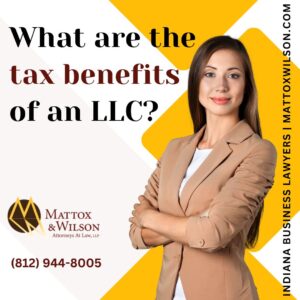southern
indiana
LLC Lawyer: What Are the Potential Benefits of Forming An LLC?
At Mattox & Wilson, we are an experienced team of business lawyers who understand the complexities and challenges of starting an Indiana business. We have worked with numerous clients to help them navigate the process of setting up their entities, and one of the questions we often encounter is, “What are the potential advantages of forming an LLC?” In this article, we will explore the potential tax benefits that may arise from setting up a Limited Liability Company (LLC) and explain why it might be the right choice for your business.
Do not leave your company’s future to chance. Let the experienced business attorneys at Mattox & Wilson guide you through the complexities of forming an entity and managing other complex business matters. Take the first step toward success and peace of mind by calling us today to schedule your consultation. Together, we’ll ensure your business has a strong foundation for growth and prosperity.

What Is A Limited Liability Company?
An LLC is a flexible business entity that combines the liability protection of a corporation with pass-through taxation (meaning that the entity itself is not taxed). This hybrid structure is what makes an LLC an attractive choice for many business owners.
Pass-Through Taxation
Most traditional corporations (those that do not have chapter-S taxation) are taxed at two points. First, the corporation itself is taxed on profits and losses. Second, shareholders are taxed on dividends that are paid to them. This is not the case with LLCs.
LLCs are not taxed at the company level. Instead, profits and losses from the company are allocated to the individual owners based upon their percent ownership, and then the owners are taxed based upon such amount. As a result, if a person owns 50% of an LLC, and the LLC makes $100,000, 50% of that amount (or $50,000) is allocated to the individual, and the individual then must pay tax on this amount.
Limited Liability Protection
LLC members are generally not personally liable for the debts and obligations of a business, which means that their personal assets are typically protected in cases of certain lawsuits or claims against the company. This is another big advantage for businesses owners, especially compared to operating as a “sole proprietorship”, in which an individual may be personally liable for business obligations and debts.
In rare circumstances an LLC could be exposed to personal liability. These situations typically involve:
- Fraud or Misrepresentation. If a member uses an LLC to commit fraud or misrepresent facts to third parties, the courts may pierce the veil to hold the member personally liable for their actions.
- Co-mingling of Assets. Mixing personal and business assets, or failing to maintain separate financial records, can lead to the loss of limited liability protection, as the courts may view the LLC and its member as a single entity. To avoid this risk, business owners should treat the business separately from their personal affairs, and should not (for example) use a business to pay their personal debts (like rent or a mortgage). Instead, the LLC should make a distribution of funds (i.e. issue a check) to the owner, who can then deposit the funds into their personal bank account and then pay rent or their mortgage.
- Undercapitalization. If an LLC is inadequately funded, leading to an inability to meet its obligations, the courts may find that the LLC is a mere facade and pierce the veil to hold the member personally liable. To avoid this risk, an owner should make an initial contribution to their LLC of at least an amount necessary to pay initial expenses while their business gets started.
- Personal Guarantee. A personal guarantee means exactly what is implied. If a member personally guarantees a loan or other obligation of an LLC, they may be held personally liable for that specific obligation, even if the LLC structure remains intact and they have done nothing wrong. In essence a personal guarantee means if the company cannot pay what it owes, the individual will pay whatever amounts are owed that the company cannot pay.
It is essential to consult with an experienced lawyer to ensure your LLC is structured and maintained correctly to minimize the risk of piercing the veil and potentially incurring personal liability. As Indiana business attorneys with decades of legal experience, we can answer any questions that you may have and provide strategic guidance for complying with entity formation requirements.
Deductible Business Expenses
As with corporations, LLCs may deduct relevant business expenses, which will reduce taxable income. Typically, deductible expenses include matters such as rent, utilities, employee wages, and other legitimate expenses. If the business is operated out of an owner’s home, certain household expenses may also be deductible.
While awe are experienced business lawyers, we do not provide tax advice. For tax matters ranging from business taxation to home office deductions, we highly recommend consulting with a certified public accountant or a tax advisor. They can provide specialized guidance tailored to your unique circumstances and business model.
Schedule A Consultation With An Experienced New Albany LLC Attorney Today.
As New Albany business attorneys with decades of legal experience, we can discuss your business goals, answer any questions that you may have, and provide strategic and pragmatic guidance on the entity structure which may be best suited for your needs. Call our office today to schedule a consultation.
